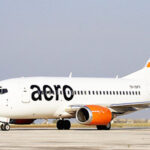
The Nigerian Civil Aviation Authority (NCAA) has clarified the circumstances surrounding its decision to clear the co-pilot of Air Peace, who was reportedly indicted alongside his colleagues for involvement with hard drugs and alcohol.
An Air Peace aircraft had a runway excursion on a Sunday, June 13, after landing at the Port Harcourt International Airport. The aircraft veered off the runway without any damage.
The Nigeria Safety Investigation Bureau (NSIB) revealed that the aircraft touched down 2,264 metres from the runway threshold, well beyond the recommended touchdown zone, and eventually came to a stop at 209 metres into the clearway.
NSIB indicted the crew members concerned following a medical test of their bloodstreams. The airline has since faulted this indictment and denied the allegations.
Speaking on the matter during an X space yesterday, the Director of Public Affairs and Consumer Protection at the NCAA, Michael Achimugu, emphasised that the regulatory body followed due process based on the available facts and internal investigations.
He explained that both the NCAA internal investigation and the NSIB report did not indict the co-pilot, the reason for his clearance and return to work.
He also said the durability of the NCAA rules is occasionally tested by real-life incidents, saying this was why the rules are subjected to reviews consistently.
“I learnt yesterday that the NCAA was being blamed for giving clearance to the first officer. But based on the NCAA internal findings and the NSIB preliminary report, the co-pilot was not found culpable.
“In fact, he advised the captain to go around, which the captain did not heed. Given that, we believe it is unjust to keep someone grounded for a year while an investigation is ongoing if there is no evidence of wrongdoing.” Achimugu said.
Speaking on airlines’ internal measures, the NCAA publicist said, “Airlines are allowed to have internal policies and mechanisms on certain issues, and they are required to submit compliance reports to the authority. However, as is the case globally, no matter how sound regulations may appear on paper, their true strength is only revealed when tested by real-life incidents. That is why regulations remain subject to review and updates.”
The director, however, pointed out that the matter would be addressed by the Director General of the NCAA, Capt Chris Najomo, who is already conducting investigations on the matter.
He further clarified that the NCAA follows internationally recognised procedures for post-incident assessments, including the use of NCAA-approved testing centres.
He also noted that some questions remain unanswered, particularly on the side of the NSIB, which is the statutory body responsible for conducting accident and incident investigations in the country.
He said: “I have reached out to the NSIB and spoken to their team, but I’m still waiting for comprehensive feedback. I flagged certain inconsistencies that I believe require urgent clarification. My DG has just returned to the country and is expected to speak to the matter formally tonight.”






